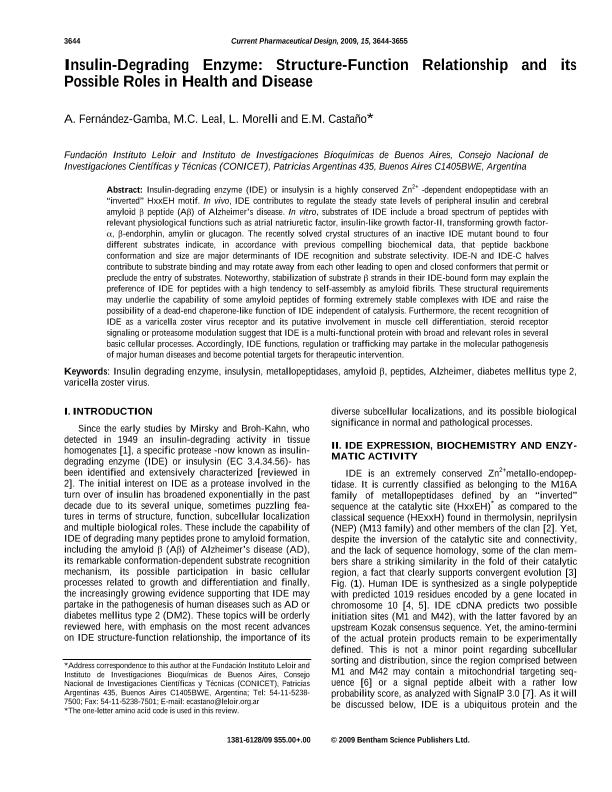Artículo
Insulin-degrading enzyme: Structure-function relationship and its possible roles in health and disease
Fecha de publicación:
11/2009
Editorial:
Bentham Science Publishers
Revista:
Current Pharmaceutical Design
ISSN:
1381-6128
e-ISSN:
1873-4286
Idioma:
Inglés
Tipo de recurso:
Artículo publicado
Clasificación temática:
Resumen
Insulin-degrading enzyme (IDE) or insulysin is a highly conserved Zn 2+-dependent endopeptidase with an "inverted" HxxEH motif. In vivo, IDE contributes to regulate the steady state levels of peripheral insulin and cerebral amyloid β peptide (Aβ) of Alzheimer's disease. In vitro, substrates of IDE include a broad spectrum of peptides with relevant physiological functions such as atrial natriuretic factor, insulin-like growth factor-II, transforming growth factor-α, β-endorphin, amylin or glucagon. The recently solved crystal structures of an inactive IDE mutant bound to four different substrates indicate, in accordance with previous compelling biochemical data, that peptide backbone conformation and size are major determinants of IDE recognition and substrate selectivity. IDE-N and IDE-C halves contribute to substrate binding and may rotate away from each other leading to open and closed conformers that permit or preclude the entry of substrates. Noteworthy, stabilization of substrate β strands in their IDE-bound form may explain the preference of IDE for peptides with a high tendency to self-assembly as amyloid fibrils. These structural requirements may underlie the capability of some amyloid peptides of forming extremely stable complexes with IDE and raise the possibility of a dead-end chaperone-like function of IDE independent of catalysis. Furthermore, the recent recognition of IDE as a varicella zoster virus receptor and its putative involvement in muscle cell differentiation, steroid receptor signaling or proteasome modulation suggest that IDE is a multi-functional protein with broad and relevant roles in several basic cellular processes. Accordingly, IDE functions, regulation or trafficking may partake in the molecular pathogenesis of major human diseases and become potential targets for therapeutic intervention.
Archivos asociados
Licencia
Identificadores
Colecciones
Articulos(IIBBA)
Articulos de INST.DE INVEST.BIOQUIMICAS DE BS.AS(I)
Articulos de INST.DE INVEST.BIOQUIMICAS DE BS.AS(I)
Citación
Fernandez Gamba, Agata Claudia; Leal, Maria Celeste; Morelli, Laura; Castaño, Eduardo Miguel; Insulin-degrading enzyme: Structure-function relationship and its possible roles in health and disease; Bentham Science Publishers; Current Pharmaceutical Design; 15; 31; 11-2009; 3644-3655
Compartir
Altmétricas




